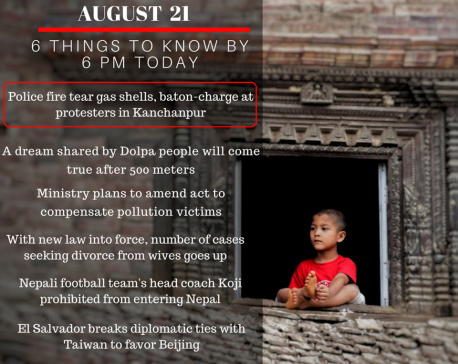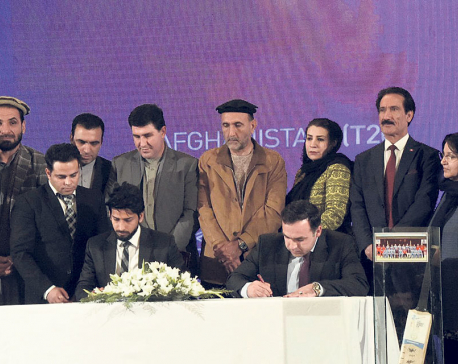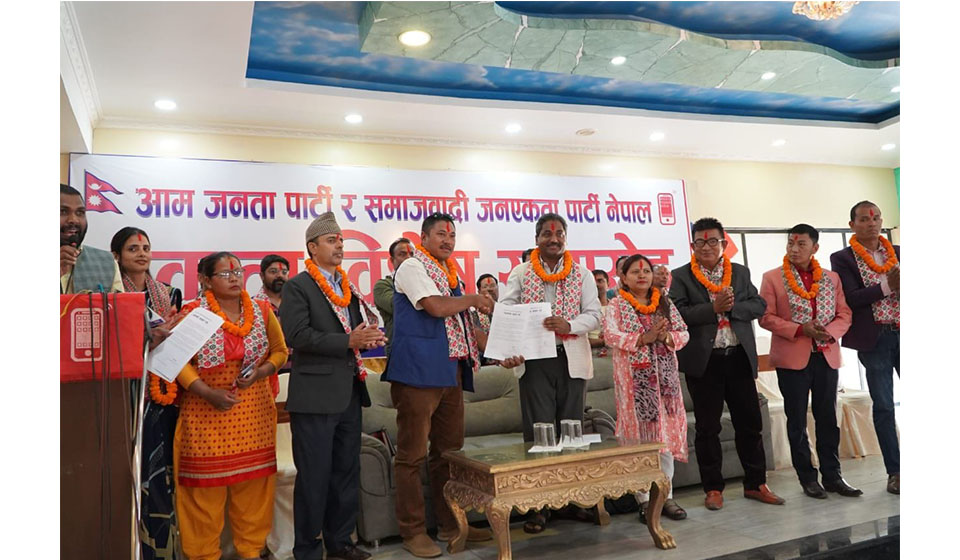
OR
Opinion
Nepal's economic diplomacy needs more focus on development
Published On: July 8, 2023 09:00 AM NPT By: Hari Prasad Shrestha

More from Author
- Why Federalism has Become Risky for Nepalese Democracy
- Hunger is a Serious Problem in South Asia
- Tourism Can Be A Catalyst For Change in Karnali Province
- Nepal’s Southern Border Has Become An Open Regional Crossroads
- Opening a new gateway for Kailash Mansarovar Yatra through Nepalgunj-GunshaNagari flight
Japan's foreign policy focuses on strengthening economic diplomacy as a means of driving economic growth.
Economic diplomacy utilizes economic mechanisms such as trade, investment, finance, and development assistance to achieve foreign policy goals and advance a nation's interests in the international arena.
The Ministry of Foreign Affairs (MoFA) organized the second edition of the Prof Yadu Nath Khanal Lecture Series on June 25, 2023, focusing on the theme "Safeguarding Nepal's National Interests: Foreign Policy Choices in the Changing International Environment." Late Khanal is often regarded as the great pioneer who formulated Nepal's foreign policy. He served as an advisor to the government on external affairs from the time of Late King Mahendra to Late Prime Minister Girija Prasad Koirala.
A number of foreign policy experts participated in the program. The speaker for this year's session, former Foreign Secretary and Permanent Representative of the United Nations in New York, Madhu Raman Acharya, emphasized in his comprehensive presentation that Nepal should take advantage of the "transit economy" and opportunity and benefit from cooperation or competition between India and China. He stressed that Nepal should not fear its neighbors and should assess situations for its own benefit. He also highlighted the importance of Nepal's economic diplomacy and suggested increasing investment in Nepal's diplomatic sector.
Since economic diplomacy plays a crucial role in external affairs, diplomats need to actively contribute through their economic knowledge and diplomatic skills, utilizing economic tools to advance the country's economic, political, and strategic goals. The objectives of the MoFA state that Nepal's economic diplomacy aims to contribute to the socio-economic transformation of the country by conducting economic diplomacy in sectors such as development cooperation, investment mobilization, export promotion, and tourism promotion.
Nepal's global network of diplomatic missions can leverage their experiences in dealing with foreign government officials and external investors to promote the country's economic value proposition. They should prioritize engagement with countries that contribute the most to our economy. These countries can be classified as follows: top export destinations - India, the USA, Germany, the UK, Turkey; top import source countries - India, China, Argentina, the UAE, the USA; top foreign investors - China (Mainland), India, the USA, South Korea, British Virgin Islands; top tourist source countries - India, China, the USA, the UK, Russia; top bilateral development partners - the USA, the UK, China, India, Japan; top multilateral development partners - the World Bank, the Asian Development Bank, the European Union, the United Nations, the Global Alliance for Vaccines and Immunization (Gavi); and top destinations for overseas employment - Qatar, Saudi Arabia, the UAE, Bahrain, and Oman.
Japan's foreign policy focuses on strengthening economic diplomacy as a means of driving economic growth. Japan's economic diplomacy model, which supports overseas business expansion of national companies in collaboration with diplomatic missions, has helped Tokyo achieve a global footprint. Economic diplomacy utilizes economic mechanisms such as trade, investment, finance, and development assistance to achieve foreign policy goals and advance a nation's interests in the international arena. Economic diplomacy should promote economic growth, job creation, and international cooperation to accelerate economic development.
Effective economic diplomacy requires technical expertise to analyze the impact of the receiving state's economic situation on its political climate and the sending state's economic interests. The execution of economic diplomacy requires versatility, flexibility, sound judgment, and strong business skills. Nepal can play a significant role in green energy diplomacy as a leader in supplying cheap and reliable hydro power in the South Asia region. Additionally, Nepali missions abroad can play a major role in promoting tourism through economic diplomacy, attracting tourists to visit Nepal.
Another area where diplomats need to invest more energy and effort is attracting foreign assistance and investment in infrastructure. While there have been commitments and agreements in the hydropower sector, other infrastructure sectors such as international airports, oil refineries, fertilizer plants, high-speed roads, railways, waterways, cable cars, industrial districts, and mechanization of agriculture are of significant importance for external financing and investment. The success of Nepal's economic diplomacy can be measured by its ability to engage multinational corporations in securing investments for the country and pursuing an export-driven growth strategy through the internationalization of the local manufacturing industry.
Our diplomats can provide sector-specific and customized advice to local manufacturers, including analytical insights about foreign markets and specific opportunities that can facilitate Nepali businesses. However, Nepal seems to struggle in trade diplomacy with its neighboring countries, leading to a deterioration in the balance of trade each year. Protecting and providing better opportunities for the Nepalese workforce abroad is also an important responsibility for our diplomats. In Nepal, the practice of appointing inexperienced workers of political parties as ambassadors has been a source of discontent, which not only degrades Nepal's diplomatic capabilities but also tarnishes the nation's image. Foreign relations experts opine that national interests must take precedence over party interests during the appointment of ambassadors and in matters of external relations. Ambassadors’ qualifications and experiences should be determined by laws approved by the parliament. Currently, individuals without proper qualifications, training, or diplomatic experience can be appointed as ambassadors of Nepal. Consequently, many of Nepal's diplomatic missions abroad are perceived as ineffective in fulfilling their roles, including economic diplomacy.
Furthermore, as an important aspect of economic diplomacy, relevant departments and divisions associated with economic diplomacy across different ministries should be integrated or coordinated by law under the Ministry of Foreign Affairs. Additionally, government departments associated with foreign aid, such as the International Economic Cooperation Coordination Division of the Ministry of Finance, should be brought under the Ministry of Foreign Affairs to enhance practicality and effectiveness in economic diplomacy and foreign assistance.
Mobilizing Non-Governmental Organizations, Non-Resident Nepali Organizations, business communities, and investors is considered soft power and involves track two actors in economic diplomacy processes. The Ministry of Foreign Affairs and Nepali missions abroad should play a pivotal role in coordinating with them. Switzerland's strong neutrality and effective economic diplomacy have led to nearly two-thirds of the United Nations' business activities being carried out by its agencies in Geneva. Nepal can adopt a similar strategy by improving the physical infrastructure in cities like Kathmandu and Pokhara, positioning them as regional hubs for international legal activities and international relations, such as regional arbitration centers and think tanks.
During discussions on the federal budget related to the Ministry of Foreign Affairs, many members of parliament emphasized the ineffectiveness of most Nepali missions abroad in economic diplomacy. They highlighted the need for our embassies, especially in India, China, the USA, and labor destination countries, to effectively engage and work in favor of national development, rather than being an economic burden on the state.
You May Like This

Aug 21: 6 things to know by 6 PM
Your daily dose of missed important news of the day. ... Read More...

Nepal online trade: Decorating Nepal
Nepal Online Trade is a business initiative of Sajak Yonjan that sells décor materials imported from China, Hong Kong, and... Read More...

MCC lists Nepal in overseas development strategy
KATHMANDU, Jan 12: Marylebone Cricket Club (MCC) has shortlisted Nepal in their support to maximize developing cricket nations. In a meeting... Read More...




Just In
- Sunkoshi-Marin Diversion Project’s tunnel construction nears completion, breakthrough scheduled for May 8
- Govt tightens security arrangement for Third Investment Summit 2024
- Pesticide residue found in vegetables in Nepalgunj
- Aam Janata Party and Samajwadi Jana Ekata Party merge
- 1,600 participants confirmed for Nepal Investment Summit
- Ilam-2 by-elections held peacefully, vote count likely to start tonight
- NEA schedules five-day power cut across Kathmandu Valley for underground cable installation
- Hundreds of passengers including foreign tourists in distress as poor visibility halts flights to and from PRIA








-1200x560-wm_20240427144118.jpg)





Leave A Comment